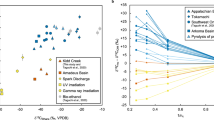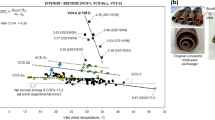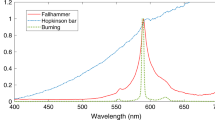Abstract
IN a recent communication having the above title, Baertschi, Kuhn and Kuhn1 expressed surprise that substitution of carbon-13 for carbon-12 in the molecules CHCl3, CCl4, CH3OH and C6H6 caused an enhancement of volatility, whereas substitution of chlorine-37 for chlorine-35 in the first two compounds, and of oxygen-18 for oxygen-16 in methanol, had the opposite effect. This led them to suggest that it might be a general rule for isotopic molecules containing a central atom that the molecular variety having the heavier isotope as central atom is more volatile than the isotopic molecule with the lighter central atom.
This is a preview of subscription content, access via your institution
Access options
Subscribe to this journal
Receive 51 print issues and online access
$199.00 per year
only $3.90 per issue
Buy this article
- Purchase on Springer Link
- Instant access to full article PDF
Prices may be subject to local taxes which are calculated during checkout
Similar content being viewed by others
References
Baertschi, P., Kuhn, W., and Kuhn, H., Nature, 171, 1018 (1953).
Hinshelwood, C. N., “The Structure of Physical Chemistry”, 142 (Oxford, 1951).
Author information
Authors and Affiliations
Rights and permissions
About this article
Cite this article
BRADLEY, D. Fractionation of Isotopes by Distillation of some Organic Substances. Nature 173, 260–261 (1954). https://doi.org/10.1038/173260a0
Issue Date:
DOI: https://doi.org/10.1038/173260a0
This article is cited by
-
Molecular Weight and Volatility
Nature (1954)
Comments
By submitting a comment you agree to abide by our Terms and Community Guidelines. If you find something abusive or that does not comply with our terms or guidelines please flag it as inappropriate.



